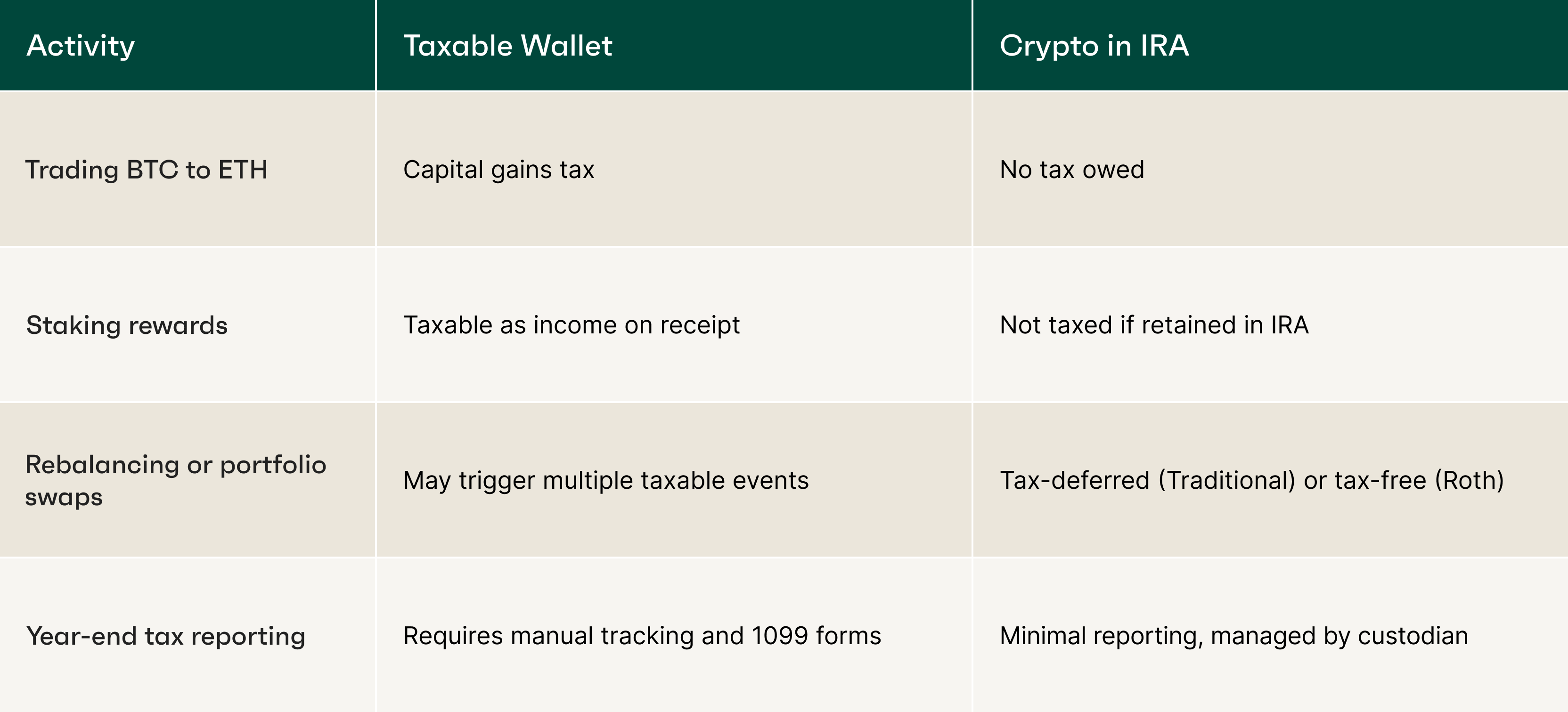Cryptocurrency tax regulations continue to evolve, particularly for investors who use IRAs to hold digital assets. In 2025, both tax reporting and compliance standards are expected to tighten, making it more important than ever for retirement investors to understand how crypto is taxed and how IRA structures may offer tax advantages or protections.
This blog explains how updated cryptocurrency tax rules in 2025 affect investors using IRAs for digital asset exposure.
How cryptocurrency is taxed in the United States
As stated in IRS Notice 2014-21, virtual currencies are treated as property for tax purposes. This means that every sale, exchange, or disposal of cryptocurrency is generally considered a taxable event, depending on circumstances, even when swapping one token for another.
Here are the key tax implications for non-IRA holders:
- Capital gains tax applies on profits from crypto sold or exchanged
- Short-term gains (assets held <1 year) are taxed at ordinary income rates
- Long-term gains (assets held ≥1 year) receive favorable tax rates (0%, 15%, or 20%)
- Crypto-to-crypto swaps, spending crypto, or using it for services are all taxable events
Taxable vs non-taxable crypto events in 2025
Understanding which crypto activities trigger taxes and which do not is key to staying compliant. The IRS classifies many common actions as taxable events, especially when assets are exchanged, sold, or received as income.
Taxable events include:
- Selling crypto for fiat (e.g., USD)
- Trading one crypto for another (e.g., BTC for ETH)
- Using crypto to pay for goods or services
- Receiving crypto through mining, staking, airdrops, or forks
Non-taxable events include:
- Buying crypto with fiat and holding it
- Transferring crypto between wallets owned by the same individual
- Gifting crypto (up to $18,000 per recipient in 2025, under IRS gift tax rules)
- Donating crypto to a qualified charity (may be deductible if properly documented)
Specific scenarios to know:
- Mining: Taxed as ordinary income at fair market value (FMV) when received. If sold later, capital gains may apply.
- Staking: Typically taxed as income at FMV when received. The IRS clarified this in Revenue Ruling 2023-14.
- Airdrops and forks: Taxed as income once the investor has control over the tokens. Later sales may incur capital gains.
- Payments: Paying with crypto is considered a sale. For example, spending 1 ETH bought at $1,000 but now worth $3,000 creates a $2,000 taxable gain.
- DeFi and NFTs: The tax treatment of DeFi and NFTs is an evolving area. Investors should consult tax professionals and refer to current IRS guidance.
Note: These rules apply to crypto held in taxable accounts. Crypto held within an IRA is generally exempt from these tax events as long as IRS compliance rules are followed.
Tax benefits make crypto IRAs attractive, but they come with compliance requirements.
2025 updates: crypto tax rules every investor should know
In 2025, several regulatory updates are tightening tax reporting obligations for cryptocurrency users:
- Form 1099-DA rollout: Centralized exchanges and platforms must issue 1099-DA forms to the IRS for user transactions
- Expanded definition of “broker”: Includes some wallet providers and DeFi interfaces—more reporting touchpoints
- Digital asset reporting thresholds: Large transfers and cross-border transactions may trigger new disclosures
- Cost basis tracking requirements: Exchanges must provide cost basis for every reported crypto transaction
Note: These rules apply to taxable accounts. Crypto inside an IRA is not subject to 1099 reporting for trades or gains.
Now that these updates are in place, understanding where IRAs provide protection becomes more relevant.
Crypto in an IRA vs crypto in a taxable wallet
Here’s how tax obligations differ between IRA-held crypto and personal wallet holdings:

This comparison assumes the IRA is in full compliance with IRS regulations and is administered by a qualified custodian.
Note: IRA custodians are responsible for reporting annual valuations on IRS Form 5498.
With these differences in mind, investors must still avoid certain actions that could disqualify their tax benefits.
Avoiding common tax pitfalls with crypto IRAs
While IRAs offer shelter from ongoing crypto tax obligations, missteps can still create issues. Common pitfalls include:
- Taking possession of crypto: Direct wallet control is not allowed and may result in a prohibited transaction, which can disqualify the IRA and trigger immediate taxation and penalties.
- Using crypto for payments or loans: Prohibited transactions trigger disqualification of IRA status
- Investing in disqualified entities: Transactions with family members or self-owned businesses are not permitted
- Excess contributions: Contribution limits must be followed across all IRA accounts
Note: Penalties for early withdrawals or disqualified transactions can be significant (including a 10% early withdrawal penalty and income tax).
Understanding how Alto CryptoIRA® addresses these tax considerations provides practical context.
How Alto CryptoIRA® addresses tax considerations
Alto CryptoIRA® offers both traditional and Roth IRA options, allowing investors to select the tax treatment most advantageous for their situations. The platform is designed to support compliance with IRS reporting obligations through custodial infrastructure and integration with Coinbase..
The integration with Coinbase facilitates proper transaction reporting and year-end valuation of all cryptocurrency holdings. The platform also provides necessary tax documentation for both contributions and distributions, streamlining compliance for account holders.
Note: Alto does not provide tax advice. Investors are responsible for ensuring compliance with IRS rules that apply to their Self-Directed IRA. While Alto CryptoIRA® provides the necessary tax documentation, investors should always consult a tax professional if they are unsure about specific rules or tax-related questions. Staying informed about evolving regulations remains essential for long-term planning.





